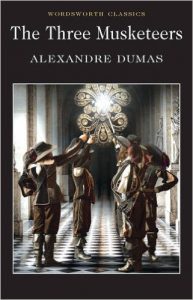The Three Musketeers
Book written by Alexandre Dumas and Auguste Maquet (uncredited)
Growing up in the middle of the 20th century in the United States, knowledge of certain tales was a given. Tom Sawyer, Robin Hood, King Arthur, and the Three Musketeers were prominent among them. That knowledge came as often from movies and Classics Illustrated comics as it did anything written down.
The Adventures of Tom Sawyer was the quintessential story of rural American youth. Mark Twain’s Huck Finn may have brought life to one of the greatest books of all time, but Tom Sawyer taught us all what a lovable scamp was. Besides, we read it long before we obtained access to its sequel.
Robin Hood and King Arthur were as necessary to common discussion as cowboys and Indians. First knowledge of England inevitably involved those two legendary figures and the story cycles surrounding them.

Then, there was Athos, Porthos, and Aramis- lest we forget d’Artagnan. You come for the swordplay and court intrigue, but you stay for the personalities. I can’t help thinking of the Beatles and the Fantastic Four here. The brilliance of each of those creations is the way individual characters are easily distinguished by clearly defined personality traits. In any individual narrative, one or the other might be the lead character, but the special characteristics of each allows the audience to identify with any one of them. If your favorite is Aramis or Ringo or the Human Torch, then you always get just enough to feel that special frisson with your patronus. Even better, you don’t have to remember what makes each of them unique. Just spend five minutes with them and it becomes so, so obvious.
Having digested Tom, Robin, and Art,
the Musketeers were a revelation. The former three had streaks of unkindness mixed with veering story lines. The Musketeers seemed as confused as I was about finding the right path, but that never stopped them from rising to one another’s aid and making hard decisions. Maybe they just hit me at the right time, but I plowed through three or four books featuring the characters.
Nowadays, I come across Dumas mostly in used book stores (and regular attempts at making a movie or television series). His collected works easily fill a shelf, but he seems to have been something of a word factory. He set up a studio where others would write the books that he would draft. He worked in the opposite vein for many of his more famous novels, using Maquet to draft the plot and characters. Then Dumas would step in and craft the final book. Maquet was apparently well-paid for his efforts and willingness to be dropped from the title page.
I doubt that he was the first ghost writer. Thousands have followed since. I do believe that contributors should be credited, but public disputes about the writer credit on movies has demonstrated that it is not always easy to tell who did what… unless of course it is.
What’s it all about?
You’ve Got to Check This Out is a blog series about music, words, and all sorts of artistic matters. It started with an explanation. 181 more to go.
New additions to You’ve Got to Check This Out release regularly. Also, free humor, short works, and poetry post irregularly. Receive notifications on Facebook by friending or following Craig.
Images may be subject to copyright.

One Reply to “Alexandre Dumas (YGtCTO Words #40)”